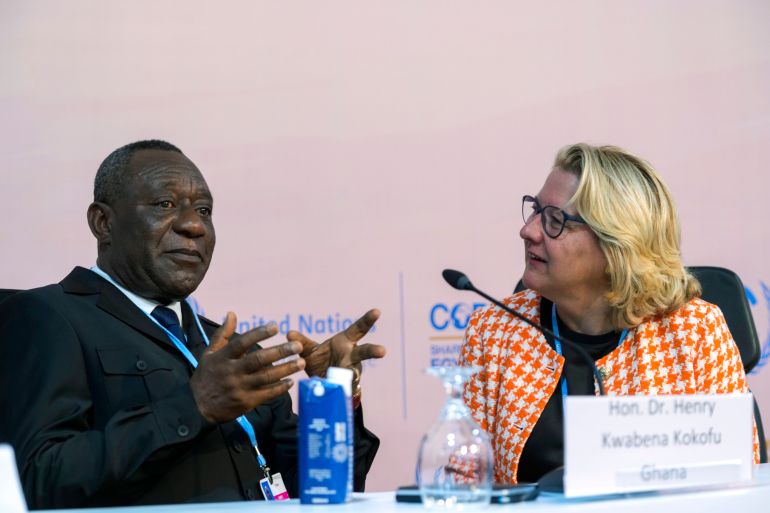Climate disaster aid scheme ‘Global Shield’ launched at COP27
The G7-led plan aims to rapidly provide prearranged insurance and protection funding after devastating events occur.

A G7-led plan dubbed “Global Shield” to provide funding to countries suffering climate disasters has been launched at the United Nations COP27 summit, although some questioned the effectiveness of the planned scheme.
Coordinated by Group of Seven president Germany and the Vulnerable Twenty (V20) group of climate-vulnerable countries, the plan launched on Monday aims to rapidly provide prearranged insurance and disaster protection funding after events such as floods, droughts and hurricanes hit.
Keep reading
list of 4 itemsPhotos: High hopes for COP27, but warnings of disappointment
‘Highway to climate hell’: High stakes at COP27
COP27 protesters call for climate reparations, human rights
Backed by 170 million euros ($175m) in funding from Germany and 40 million euros ($41m) from other donors including Denmark and Ireland, the Global Shield will in the next few months develop support to be deployed in countries including Pakistan, Ghana, Fiji and Senegal when events occur.
Some countries and campaigners were cautious, however, concerned that the plan risked damaging efforts to secure a substantive deal on financial help for so-called “loss and damage” – the UN jargon for irreparable damage wrought by global warming.
German Development Minister Svenja Schulze said the Global Shield aimed to complement, not replace, progress on loss and damage.
“It is not a kind of tactic to avoid formal negotiation on loss and damage funding arrangements here,” Schulze said. “Global Shield isn’t the one and only solution for loss and damage. Certainly not. We need a broad range of solutions.”
Some research suggests that by 2030, vulnerable countries could face $580bn per year in climate-linked “loss and damage”.
Ghana’s Finance Minister Ken Ofori-Atta, who chairs the V20 group of vulnerable countries, called the creation of the Global Shield “long overdue”.
“It has never been a question of who pays for loss and damage, because we are paying for it,” he said in recorded remarks at the summit in the Egyptian resort town of Sharm el-Sheikh.
“Our economies pay for it in lost growth prospects, our enterprises pay for it in business disruption, and our communities pay for it in lives and livelihoods lost.”
‘We are not yet persuaded’
Yet some vulnerable countries questioned the scheme’s focus on insurance, with insurance premiums adding another cost to cash-strapped countries that have low carbon emissions and contributed least to the causes of climate change.
“We are not yet persuaded, especially of the insurance elements,” Avinash Persaud, the special envoy on climate finance to Barbados Prime Minister Mia Mottley, told the Reuters news agency.
“Using insurance is a method in which the victim pays, just in installments in the beginning,” he said, adding that loss and damage finance should be grant-based.
It was not immediately clear how much of the Global Shield funding announced so far was in grant form.
Michai Robertson, a negotiator for the Alliance of Small Island States – which is championing calls for a new UN loss and damage fund in the talks this week – said even subsidised insurance premiums could enable insurance companies in wealthy countries to profit off poor and vulnerable nations’ suffering.
“There’s an inherent injustice about them profiting off of our loss and damage,” he said.
‘Life and death’
A formal loss and damage funding stream would likely go further, also covering longer-onset climate impacts such as sea level rise and threats to cultural heritage.
The V20 bloc, made up of 58 developing nations, released research this year that estimated countries had lost some $525bn to climate impacts since 2000.
Ninety-eight percent of the nearly 1.5 billion people in V20 countries do not have financial protection, it said.
“We’re talking about people living under the poverty line; they’re not going to be buying insurance,” Rachel Cleetus, lead economist at the Union of Concerned Scientists’ climate programme, told the AFP news agency.
“Insurance can help you up to a point but climate change is now creating conditions in many parts of the world that are beyond the bounds of what’s insurable,” she said, referring to sea level rise, desertification and the mass displacement of populations.
Teresa Anderson of ActionAid International said the scheme showed that the global community recognised the need to act on loss and damage, but said it was a “distraction” from negotiations on a dedicated funding mechanism for climate damages.
“Everyone knows that insurance companies, by their very nature, are either reluctant to provide coverage, or reluctant to pay out,” she said.
“But when it comes to loss and damage, this is a matter of life and death.”